Last modified on: April 15th, 2024
Which SEO tool is better, Semrush or Ahrefs?
Find out in this Semrush vs Ahrefs comparison review.
In this product comparison review, I aim to be as unbiased and honest as possible based on my experience regularly using both SEO tools over the last several years.
See the table below to quickly compare the key features between Semrush & Ahrefs.
BoostPlanner is reader-supported. If you buy through a link on my site, I may earn an affiliate commission.
What are Semrush & Ahrefs?
Semrush and Ahrefs are popular all-in-one SEO platforms with a wide set of features for SEO and digital marketing.
Semrush is the older of the two SEO tools and was started in 2008. Ahrefs was founded in 2011, making the SEO platform a couple of years younger than Semrush.
Both SEO tools have achieved 800,000+ users since their release. Both software platforms are used by freelance digital marketers, small businesses, marketing agencies, and large enterprise companies to gather market-leading organic search data and competitor insights to help improve their visibility in search engines.
In addition, both tools have earned impressive average ratings of 4.5+ stars on well-known and reputable software review sites like Capterra and G2.
Comparing Semrush and Ahrefs
Both Semrush and Ahrefs offer features that cover several core aspects of SEO. This includes keyword research, rank tracking, competitor insights, and site audits.
In comparing Ahrefs vs Semrush, the key differences between the SEO tools come down to their feature offerings and pricing plans.
Based on my experience using both tools for SEO, here's how the key features of Semrush and Ahrefs compare:
| Features | Semrush | Ahrefs |
|---|---|---|
| Keyword Research | The Keyword Magic Tool offers a large database of keyword data such as search volume and keyword difficulty for SEO and PPC campaigns. | The Keyword Explorer tool offers the largest database of keyword data such as search volume and keyword difficulty for SEO and PPC campaigns. |
| Rank Tracking | Rank tracker with daily keyword ranking updates. Track keywords in Google's search engine. | Rank tracker with 3, 5, or 7-day updates depending on plan (add-on available for daily updates). Track keywords in Google, YouTube, Bing, and Yahoo. |
| Competitor Research | Domain analysis with organic traffic and PPC insights, top pages, and keyword rankings. | Site Explorer tool with organic traffic and PPC insights, top pages, and keyword rankings. |
| Backlink Analysis | Largest backlink database with backlink audit and outreach tools. Monitor backlinks for changes such as new and lost links and link toxicity. | Large backlink database. Monitor and audit backlinks for changes such as new and lost links. |
| Site Auditing | Run site audits to identify technical errors, issues, and opportunities. | Technical SEO site audits to detect errors, issues, and opportunities. |
| On-Page SEO | On-page SEO analyzer tool for page-level auditing and content optimization. | No |
| Content Marketing | Content marketing tools offered in the Guru plan (content templates, topic research, page audits, post tracking, marketing calendars). | Offers a Content Explorer tool for topic research. |
| Reporting | White-label report builder, data export options, and email reports | Data export options, email rank reports, and email alerts |
| Support | Chat, email, and phone | Chat and email |
| API Access | Requires API-specific subscription | Requires API-specific subscription |
| Fixed Plans | Starter, Guru, and Business | Lite, Standard, Advanced, and Agency |
| Pricing | Starts at $119.95 per month | Starts at $99 per month |
| Trial Offer | 7-Day Free Trial | 7 Days for $7 |
Feature Breakdown
Here is a breakdown of the core features offered by Semrush and Ahrefs, how they compare, and the key differences to consider.
Keyword Research
Let's look at how keyword research compares between Semrush and Ahrefs.
Keyword research tools are a common feature of all-in-one SEO software.
While the UIs differ, each tool provides important keyword insights like:
- Monthly search volume estimates
- Keyword difficulty to rank scores
- Google Ad CPC bidding estimates
- Level of PPC ad competition
- Total URL results for keywords
- Keyword SERP features
- Create and save keyword lists
Key Differences
Both tools offer two of the most comprehensive keyword research tools on the market.
Semrush provides a keyword database for only Google, while Ahrefs offers keyword research data for 10 search engines, including YouTube, Amazon, and Bing.
However, Semrush includes a unique column sharing the Intent or purpose behind each keyword when it's searched, such as informational, transactional, and commercial.
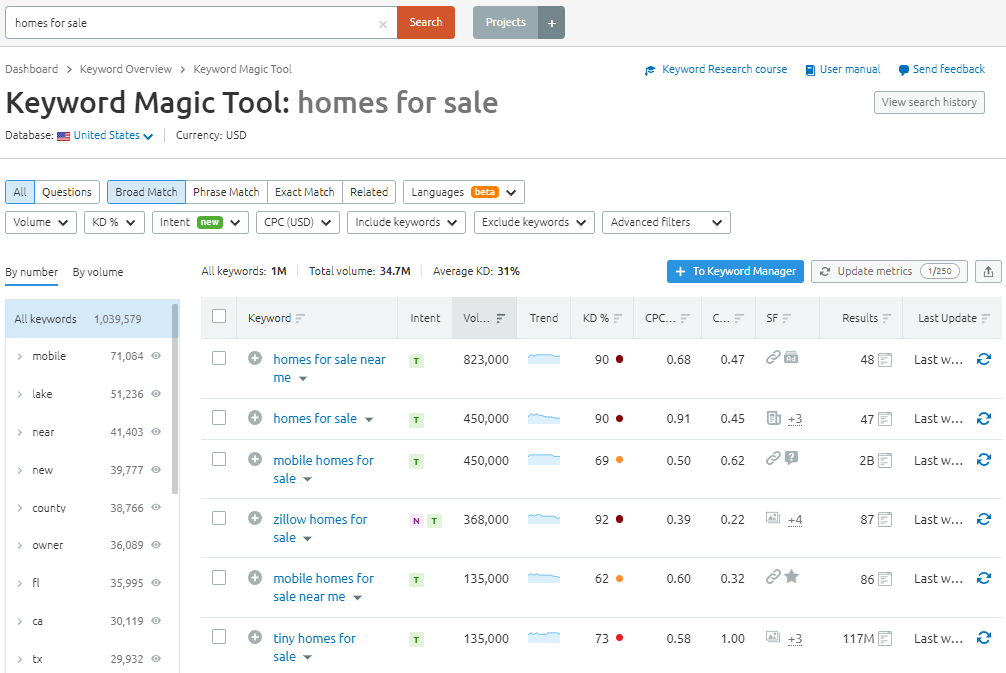
In my opinion, both keyword research tools have easy-to-understand and appealing user interface designs with helpful tooltips, sorting, and filtering options.
While Semrush has the unique keyword intent metrics, Ahrefs offers click estimates next to search volume which can be helpful to understand search behavior.
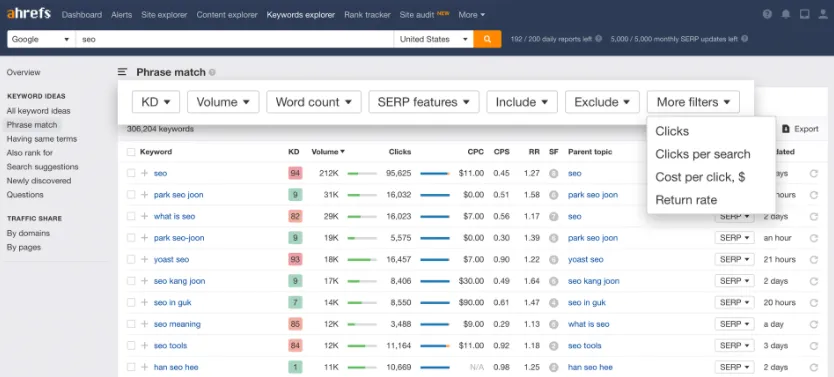
In my opinion, Semrush has an edge with Google keyword data. However, Ahrefs offers data for multiple search engines like YouTube, Amazon, and Bing.
With Google having over 90 percent of the search engine market share and traffic-generating potential, you can't go wrong with either keyword research tool.
Rank Tracking
Semrush and Ahrefss both provide keyword rank tracker tools for Google.
Both rank tracking tools offer similar features:
- Ranking fluctuations side-by-side
- Daily rank tracking options
- Competitor rank tracking
- Keyword SERP history
- Tagging and filtering
- Traffic and visibility
- Search volumes
- SERP features
Key Differences
The main difference between Semrush vs Ahrefs for rank tracking is how often your keyword ranking data is updated, as well as pricing and reporting capabilities.
Semrush offers a daily rank tracker included in each plan.
Ahrefs keyword update frequency varies depending on the plan. This includes every 7 days with the Lite plan, every 5 days with the Standard plan, every 3 days with the Advanced or Agency plans, or daily with the Rank Tracker Pro add-on offering.
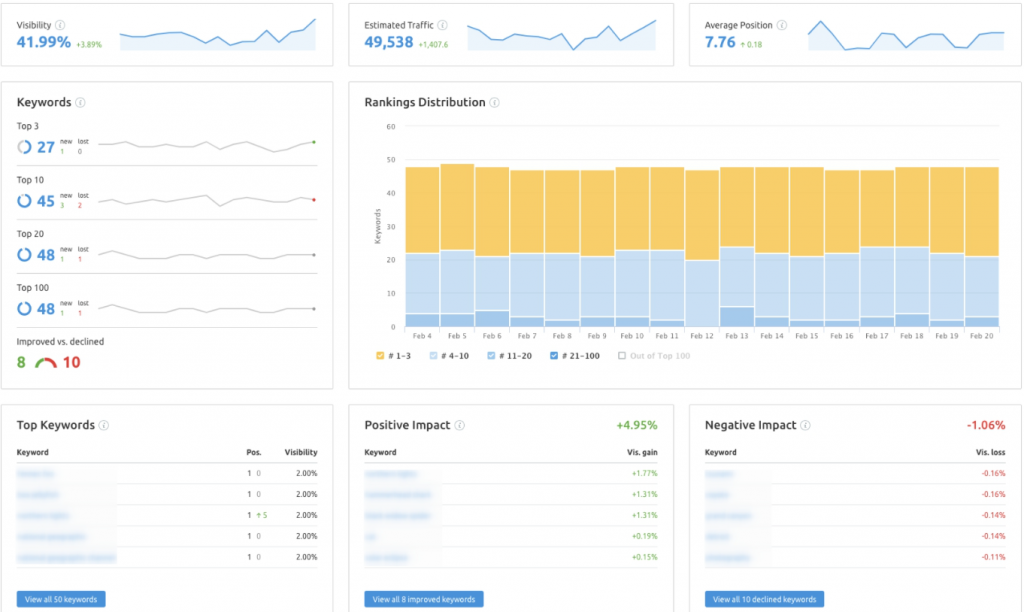
In my opinion, both interfaces are well-designed for tracking your rankings on the Google search engine results pages (SERPs) compared to other tools on the market.

In terms of functionality, both tools support Google rank tracking only and provide detailed and accurate rank tracking data.
Ahrefs offers a reliable rank tracker with a nice, functional interface. However, Semrush is more affordable if you prefer daily ranking updates.
Competitor Research
Competitive analysis tools are an essential feature of SEO platforms.
Semrush and Ahrefs offer similar metrics and insights for understanding how competitor sites are doing in regards to rankings on Google, popular pages, and traffic.
Both SEO tools include competitor insights related to:
- Domain authority scores
- Organic search traffic
- Organic keywords
- Top keywords
- Top pages
- PPC keywords
- Paid search traffic
- Backlink insights
- Gaps in keywords and backlinks
- Historical data (depending on the plan)
Key Differences
Ahrefs offers historical data in its starter plan for the last 6 months, the last 24 months with the Standard Plan, and full history with the Advanced and Agency plans.
With Semrush, the mid-tier Guru plan is required for access to historical data that goes back to 2012.
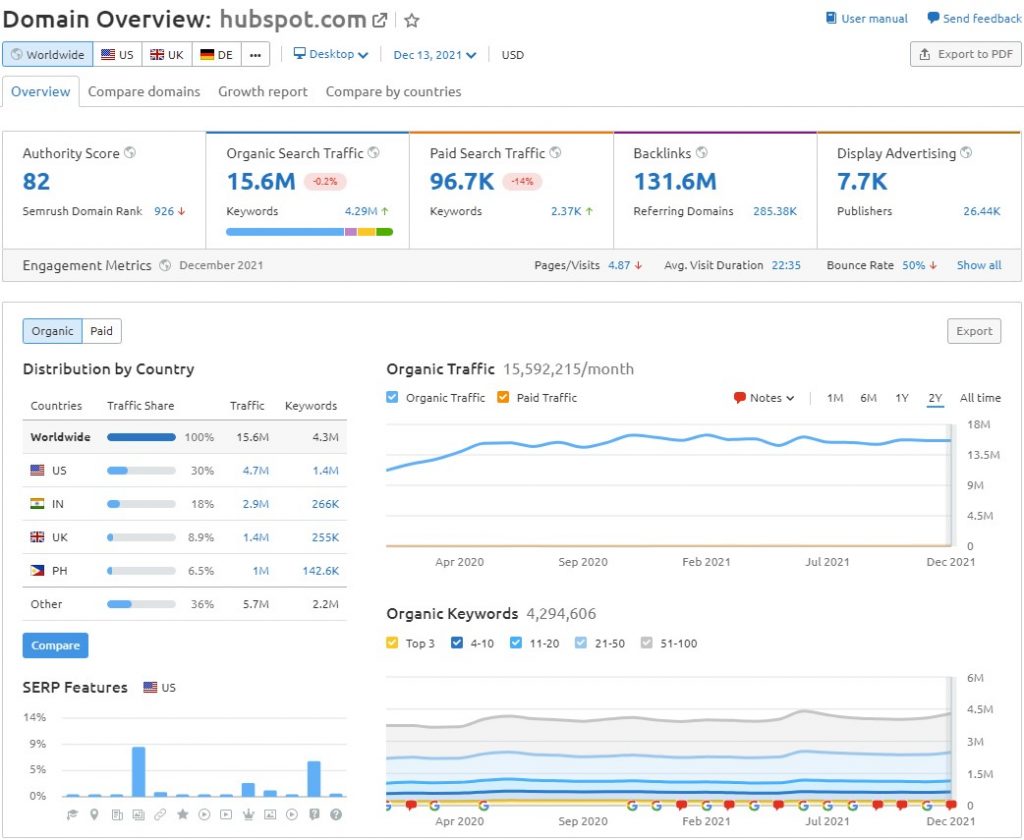
Both SEO tools provide helpful visuals for checking a website's organic traffic trend and keyword ranking growth over time, including ways to drill down into this data.
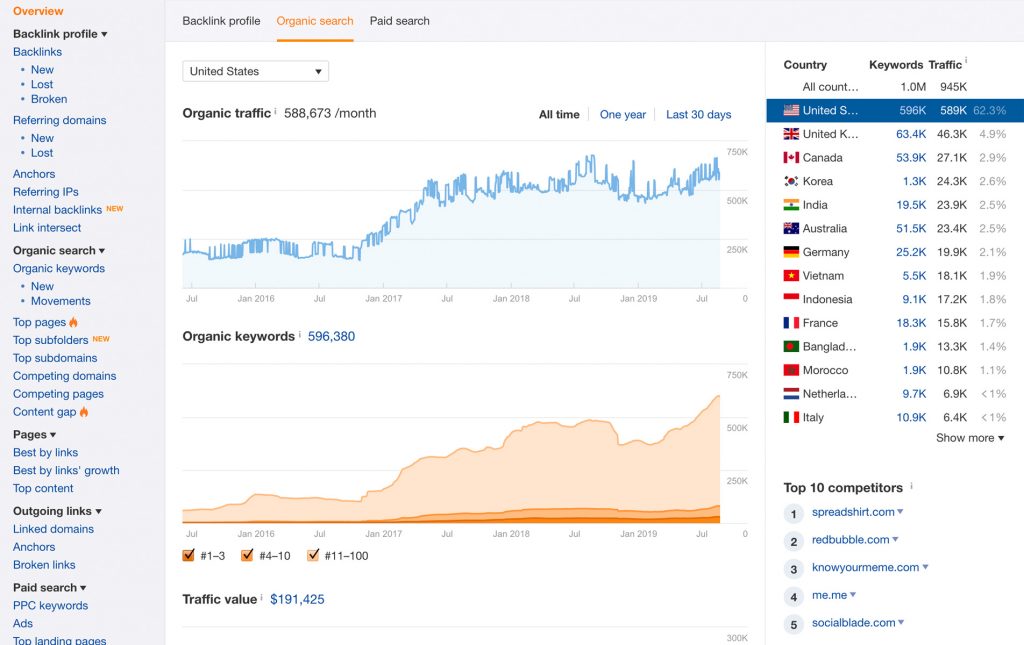
There's no clear winner in terms of competitor analysis. Both Semrush and Ahrefs are excellent tools for understanding a site's domain authority and visibility on Google.
Related: Semrush Competitor Analysis Guide
Backlink Analysis
Backlink analysis is a large part of competitor research in regards to SEO. Semrush and Ahrefs offer a range of features and metrics for analyzing and monitoring backlinks.
Both SEO tools provide the following backlink insights:
- Domain authority scores
- Page authority scores
- Individual backlinks
- Referring domains
- Referring IPs
- Link anchor text
- Dofollow and nofollow links
- Link filtering options
- New and lost domains
- New and lost backlinks
Key Differences
Ahrefs and Semrush both provide extensive backlink analysis features and insights.
However, alongside its backlink analysis tool, Semrush includes a backlink audit tool for identifying potentially harmful links as well as a tool for managing link building outreach.
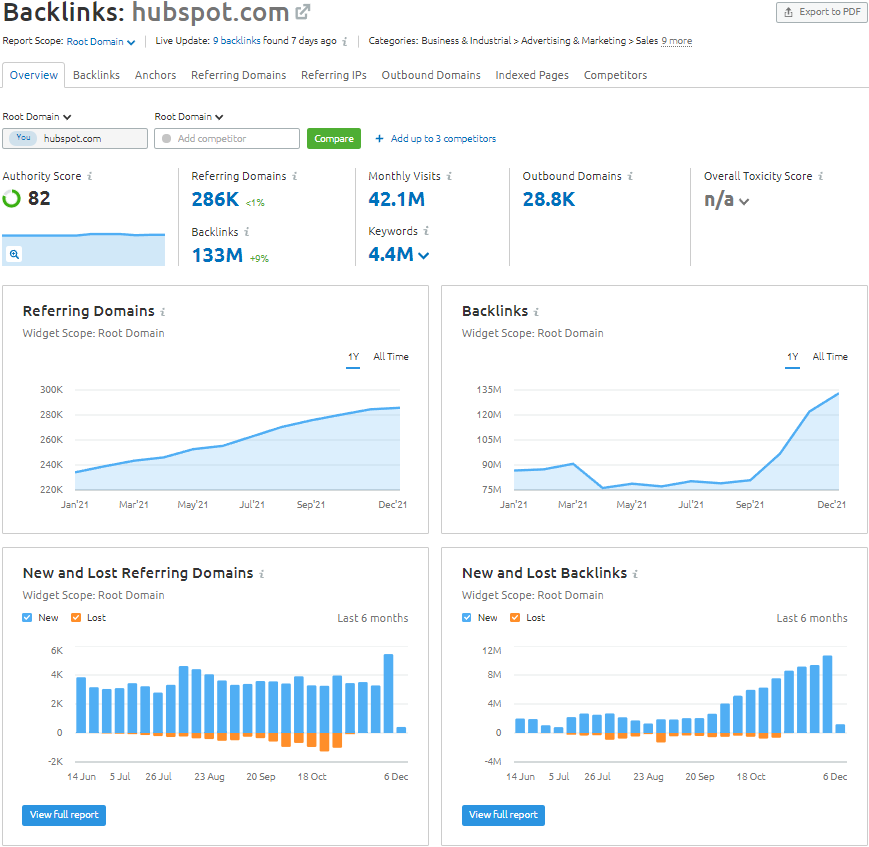
Both SEO tools provide helpful visuals for checking a website's growth in referring domains and backlinks earned over time.
You can also drill down into details on individual links, such as the link anchor text, the authority of the linking site and page, and link meta tags like “follow” and “nofollow”.
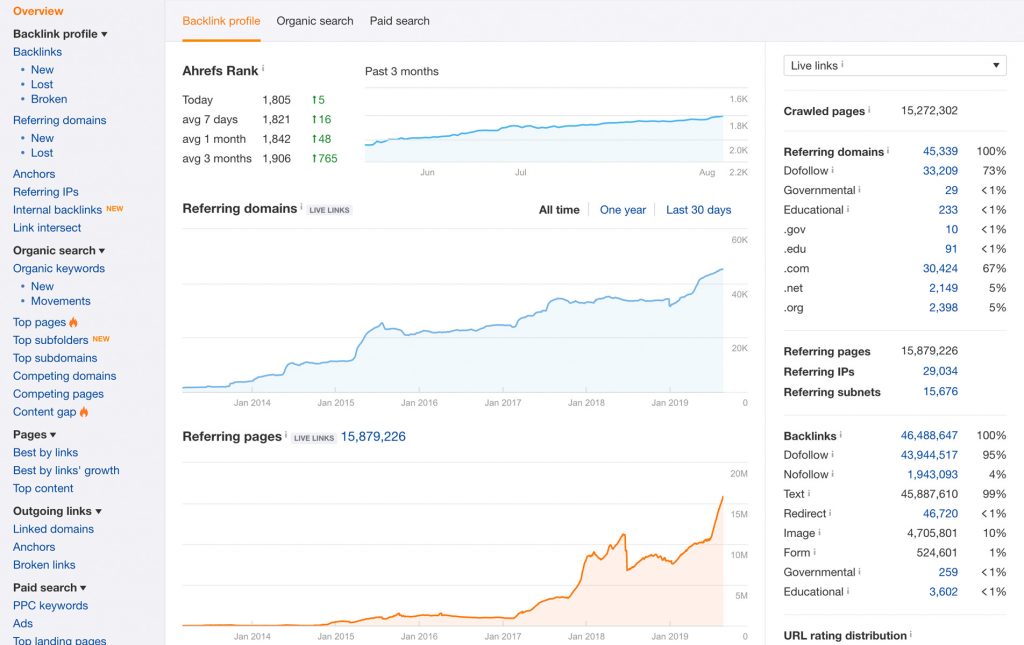
While Ahrefs started off as the leader in backlink data, Semrush now has a larger index of links and additional tools for backlink auditing and outreach management.
If you don't find the link audit or outreach tools necessary, both Semrush and Ahrefs are top choices on the market for backlink research and related competitor insights.
Site Auditing
When looking at Semrush vs Ahrefs, each tool includes an SEO audit tool to check your website for issues, errors, and optimization opportunities.
These tools help you assess site health for factors related to website security, page crawling and indexability, core web vitals, loading speeds, usability, and localization.
Both site audit tools check for potential issues like:
- Overall site health
- Duplicate content
- Index status of crawled pages
- Technical SEO issues like broken links
- Missing tags and meta descriptions
- Compare site audits and share reports
- Issues categorized by type and severity
- Descriptions of issues and how to fix them
- Custom settings to adjust audit crawls
- Schedule automated audits
Key Differences
While both Semrush and Ahrefs give you the ability to audit major site-wide technical SEO errors and issues, Semrush offers more insight at the page level with its on-page SEO tools. Ahrefs lacks features for auditing and optimizing content.
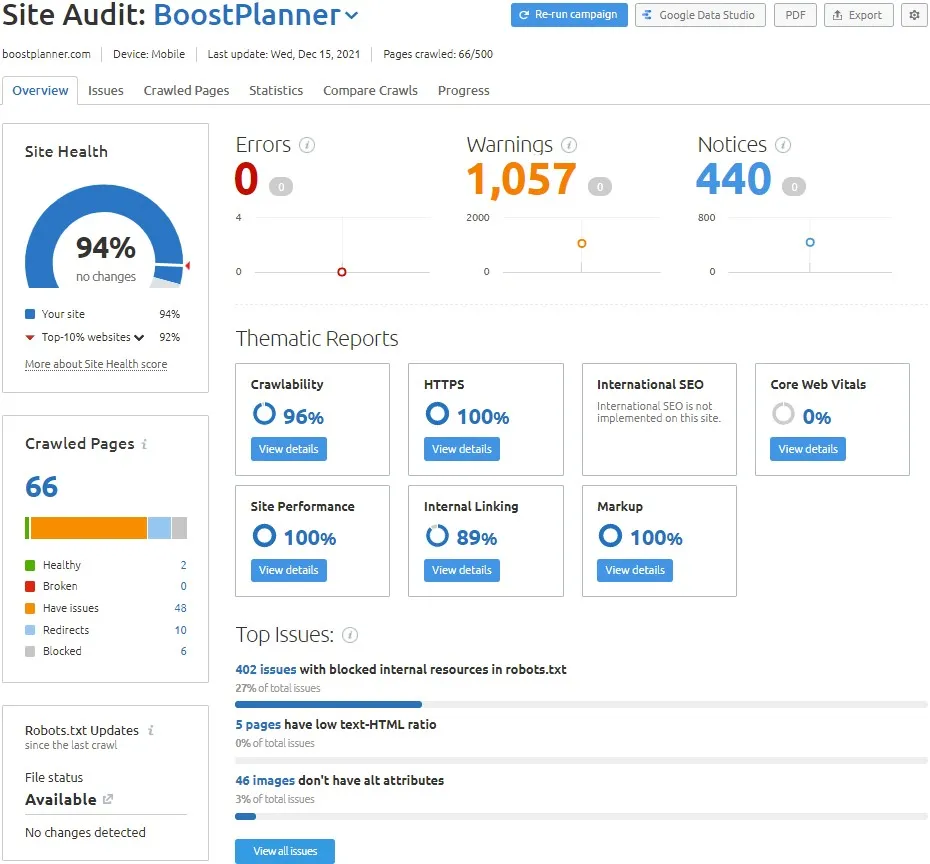
In comparing Ahrefs vs Semrush, both SEO tools include convenient site audit overview interfaces and detailed views of identified site issues.
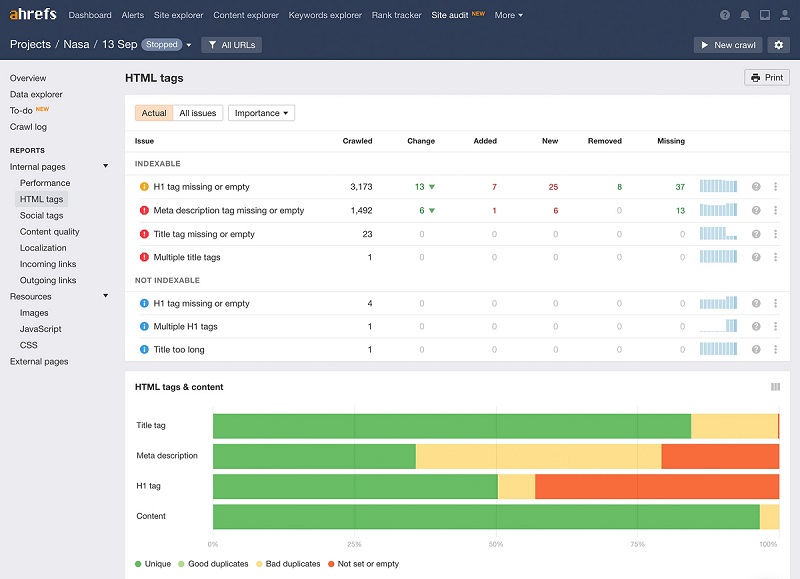
While I prefer Semrush for its on-page SEO tools and site audit speed, Ahrefs is just as effective for conducting SEO audits to identify technical site-wide errors and issues.
Reporting
The ability to create SEO reports is essential to understanding and sharing SEO campaign progress.
Semrush and Ahrefs both include features for SEO reporting such as various data export options, email notifications, and ranking reports.
Key Differences
While both tools offer export options for many of their researchable metrics, only Semrush includes a drag-and-drop report builder with widgets and templates.
However, with Ahrefs, you can still set up daily, weekly, or monthly email alerts to get notified of new & lost backlinks, web mentions, and keyword rankings.
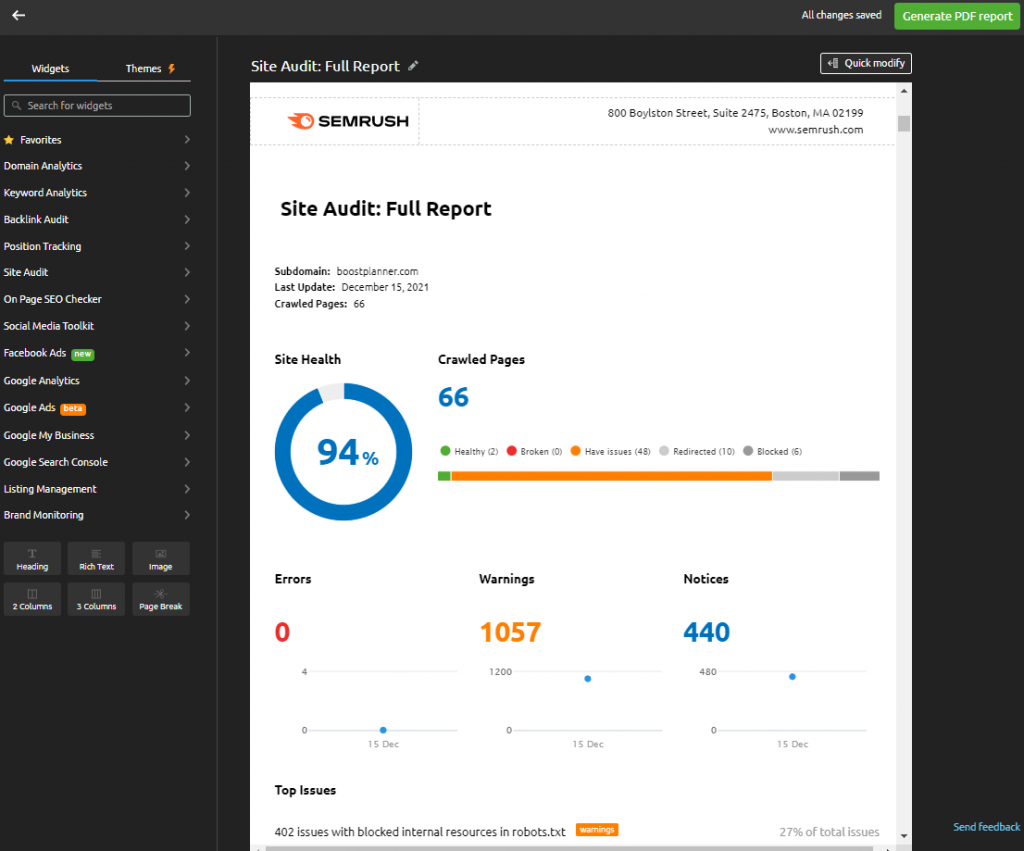
Semrush gives you the ability to start a report from scratch or template, and schedule automated SEO reports in PDF format to send by email.
With Semrush's report builder, you simply select widgets in the left-hand sidebar to create reports.
Semrush offers a Google Data Studio integration with its Guru & Business plans.
Both tools provide data export options and email notification alerts for keyword ranking changes, backlink activity, and brand mentions identified across the web.
When it comes to digital marketing and reporting beyond SEO-specific metrics, Semrush offers more comprehensive reporting capabilities than Ahrefs.
However, Ahrefs provides keyword research data for search engines beyond Google and potentially more backlink data depending on the analyzed domain that you can export and visualize with another tool like Google Data Studio.
Support
Based on my experience, both Ahrefs and Semrush offer friendly, knowledgeable support as well as many helpful articles to learn and understand their platforms.
However, Semrush offers three support channels: chat, email, and phone, while Ahrefs provides chat and email.
The contact info for each tool is pretty easy to find on their respective websites.
Semrush lists its phone number for support prominently in its website footer, with an email address and a link to the contact us page nearby. There's also a chat option available in the lower-right corner.
Ahrefs provides a support email on their about page and chat option in the lower-right corner. You can find a link to the about page in the website footer.
Pricing & Value
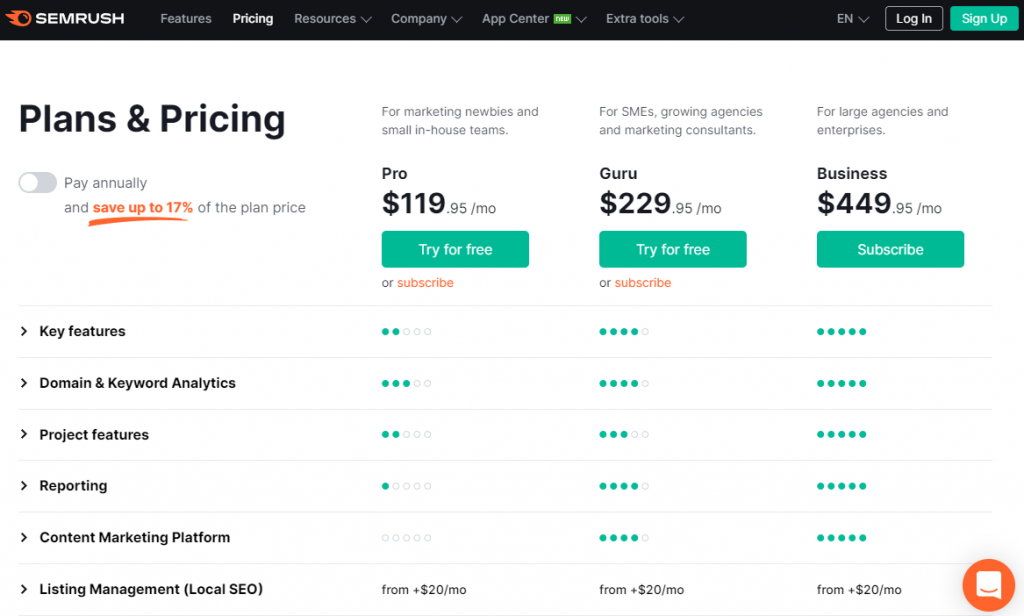
Semrush offers 3 main pricing plans:
- Pro: $129.95 per month
- Guru: $249.95 per month
- Business: $499.95 per month
Custom enterprise plans are also available.
Subscribing to an annual plan offers a discount of up to 17% off.
Semrush user limit increase options:
- Pro: +$45/mo per user
- Guru: +$80/mo per user
- Business: +$100/mo per user
Semrush also offers several add-on features including:
- Listing Management: +$20/mo per location or +$40/mo per premium location
- Semrush. Trends: +$200 per month
- Agency Growth Kit: +$100 per month
Understand the differences between Semrush pricing plans here.
Currently, Semrush offers a free trial of its Pro or Guru plan.
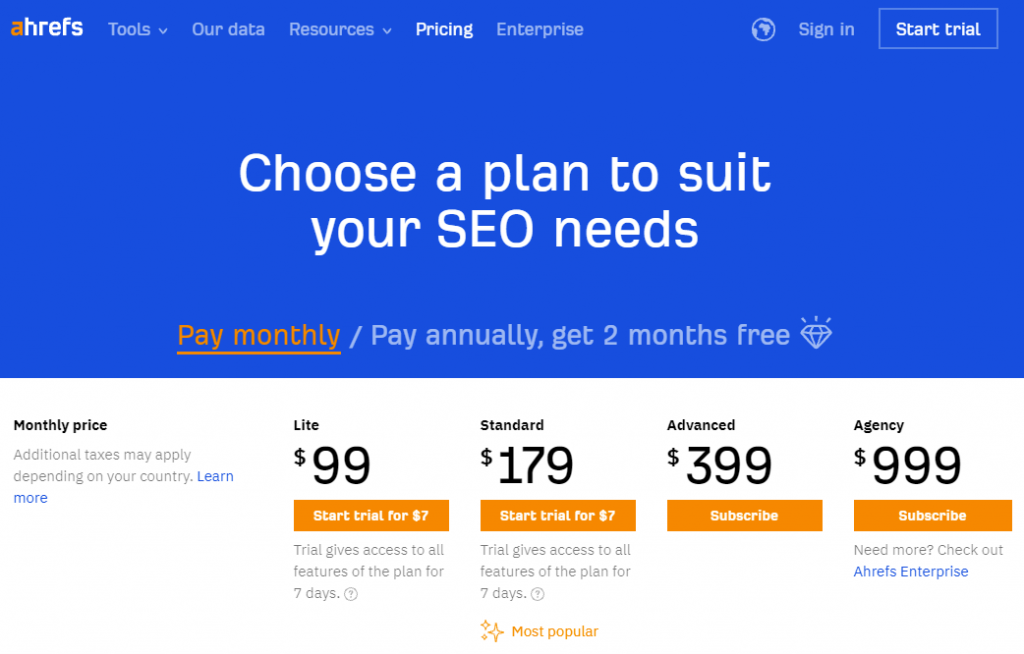
Ahrefs offers 4 primary plans:
- Lite: $99 per month
- Standard: $179 per month
- Advanced: $399 per month
- Agency: $999 per month
Custom enterprise plans are available as well.
Enrolling in an annual subscription provides 2 months free.
Free Trials
Both Semrush and Ahrefs offer a trial to try out the software before enrolling in a plan.
Ahrefs provides a free sign up with limited access to some features.
Semrush offers a 7-day free trial of its Pro or Guru plans.
Should You Choose Semrush or Ahrefs?
Which is the better SEO tool, Semrush or Ahrefs? It depends!
Both tools are a great choice for access to in-depth SEO data for competitor insights and keyword research for Google.
Ahrefs provides keyword research data for several search engines, while Semrush offers a larger feature set focused on Google data and costs a bit more.
Also, while Ahrefs shines in SEO research, Semrush is a complete SEO solution with content optimization tools, a report builder, daily rank updates in all plans, and add-on features for local listing syndication and client management.
Alternatives to Semrush & Ahrefs
When considering all-in-one SEO software, Semrush & Ahrefs aren't the only options on the market. Alternatives include:
- SE Ranking
- Moz
- SEO PowerSuite
- Mangools
- GrowthBar
- Serpstat
- Majestic
I hope you found this comparison review of Semrush vs Ahrefs useful and that you now better understand the differences between these two industry-leading SEO platforms.
Related Content: